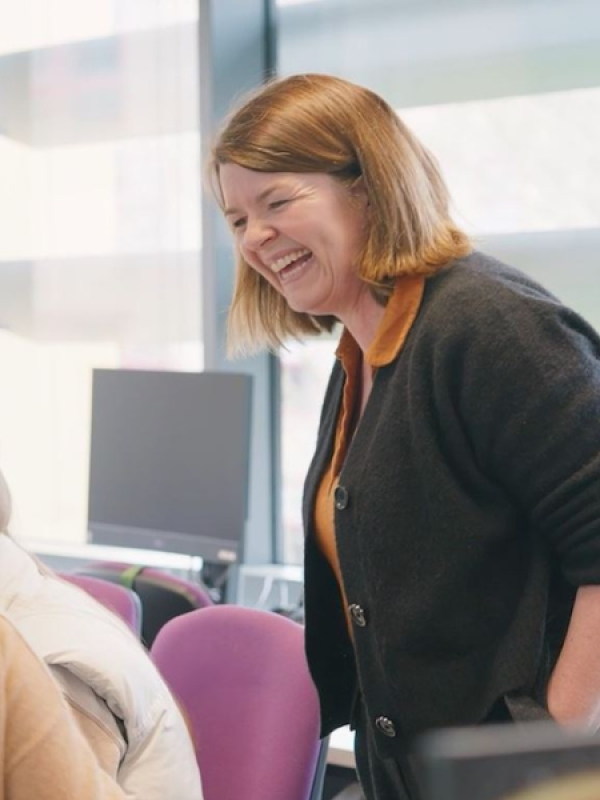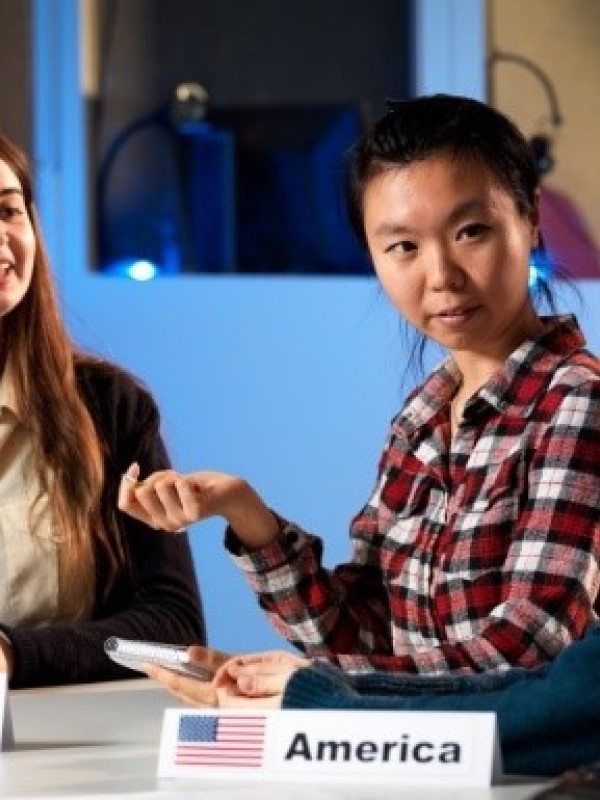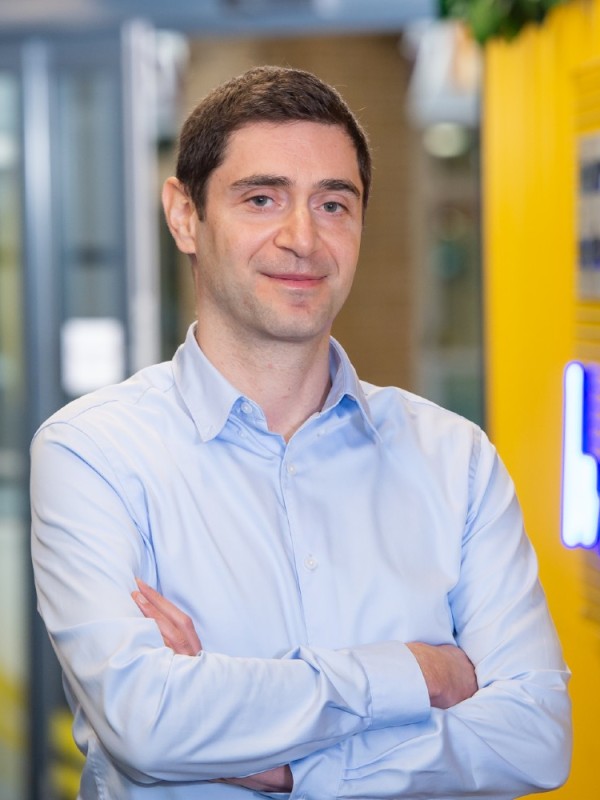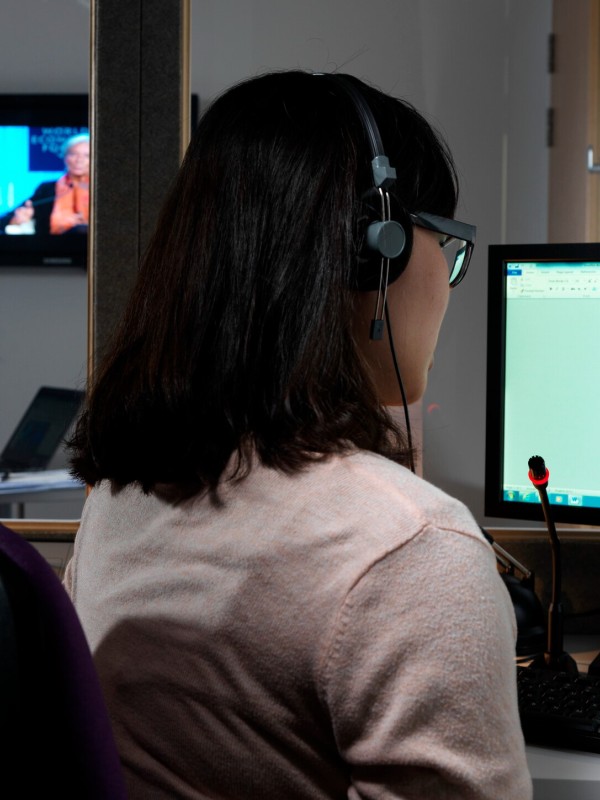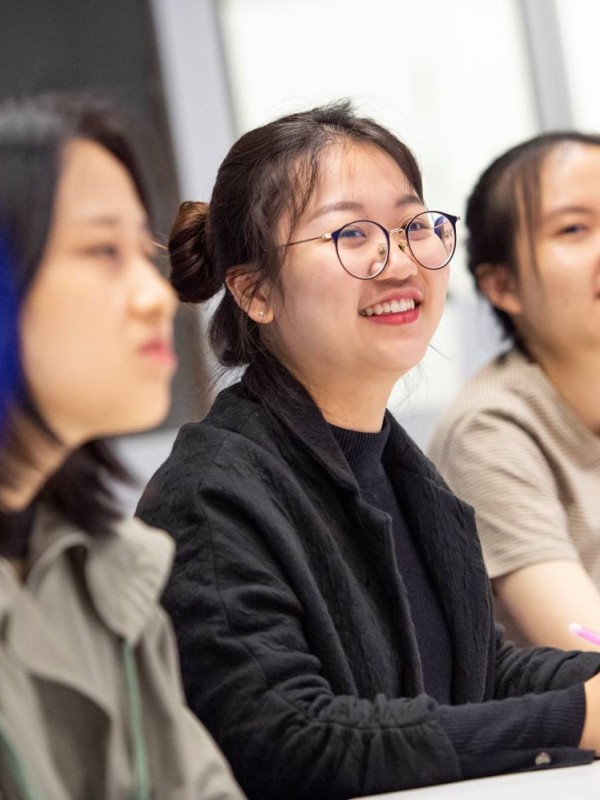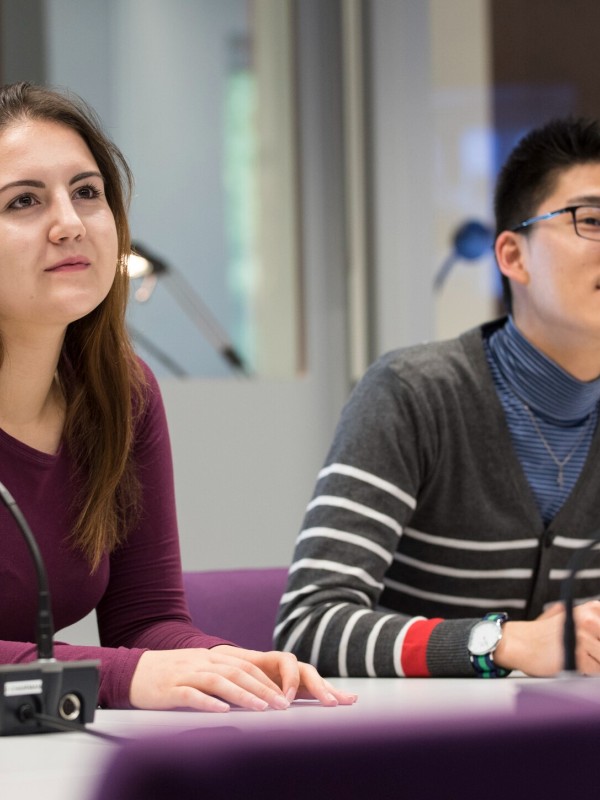
- AI for Translation and Interpreting Studies
MSc — 2026 entry AI for Translation and Interpreting Studies
This unique and innovative course places emphasis on research skills at the intersection between human translation and interpreting practice and AI. Unlock an array of career opportunities including language analyst, market researcher, or positions focusing on strategic development or research and development in the language services industry.
4,138+ people have created a bespoke digital prospectus
Why choose
this course?
- Join a new generation of translation researchers who collaborate and co-design research with language/translation service providers and users, to produce economically and socially relevant outcomes, applicable to real-world problems.
- Benefit from in-depth, systematic research training in translation and interpreting in one of the UK’s top translation centres, preparing for a PhD degree at Surrey, or placing you at the very heart of future developments in language-related industries.
- Benefit from a strong focus on the responsible integration of professional practice with AI tools in multilingual mediation.
- Supported by the Surrey Institute for People-Centred AI, our teaching is informed by an ambitious research programme focusing both on tried-and-tested professional interpreting and translation practices and AI-driven technologies, such as neural machine translation, speech technologies and generative AI (e.g. ChatGPT).
Statistics
100%
Of our literature and languages graduates go on to employment or further study (Graduate Outcomes survey 2025, HESA)
10th for research impact
The Research Excellence Framework (REF) 2021 ranked literature and languages 10th for research impact
What you will study
By studying an MSc AI for Translation and Interpreting Studies degree at Surrey, you’ll join our internationally recognised Centre for Translation Studies (CTS). We combine leading research expertise with professional relevance, providing you with the skills to thrive in either academia or industry.
You’ll explore modules on translation and interpreting research, and challenge assumptions in stimulating debates, especially on the role of the human translator in the era of artificial intelligence and increasing automation in multilingual services. You will also discuss current ideas and research with your peers, our doctoral students and teaching staff.
Our range of modules will help you develop your analytical skills. You’ll take on evidence-based, interdisciplinary research relevant to the world today, giving you a competitive edge as you enter the workplace or pursue further study.
During your studies, you will have an opportunity to demonstrate academic and professional excellence by winning prizes. These include the following:
- RWS Campus Top Student Award (two Trados Studio licenses)
- Project management training (one free-of-charge place in the Pro PM Training and Certification Programme)
- Professional Engagement Portfolio Prize
- Outstanding Translation and Interpreting Studies Dissertation Prize.
If you have any questions about this course please contact the programme leader.
An international community
The AI for Translation and Interpreting Studies MSc programme attracts students from all over the world, fostering a vibrant, multilingual and multicultural international community. Our postgraduate cohort consists of a harmonious blend of recent graduates who have completed their undergraduate courses and more mature students with different backgrounds and experience.
Professional development
You will enjoy regular seminars and workshops with professionals and academics and gain advanced knowledge in fast-developing areas, including the integration of machine translation, Natural Language Processing, LLM (large-language models) and hybrid workflows in translation/interpreting. These are also areas you will be able to explore in great depth in the MSc Dissertation in AI for Translation and Interpreting Studies project, which is longer than a typical MA dissertation.
You will gain further insights into the industry from the external guest speakers we invite to our Centre for Translation Studies seminars and workshops, such as:
- Professional translators and interpreters
- Subtitlers and audio describers
- Professionals working in public services, companies and international organisations
- Representatives of professional translator and interpreter associations
- Translation and interpreting researchers.
By placing greater emphasis on analytical and research skills, this programme prepares you to work as language analyst or market researcher, or in positions focusing on strategic development and on research and development in the translation industry.
Industry links
We have forged close links with the main professional bodies in the language industry. For example, we are part of the prestigious Higher Education Partnership of the Chartered Institute of Linguists (CIoL) and a corporate member of the Institute of Translation and Interpreting (ITI). You can join these bodies as a student member during the course and become a full member after you graduate.
We also collaborate with the Translation Automation User Society (TAUS), the European Language Industry Association (ELIA), and the Globalization and Localization Association (GALA), which gives you the possibility to apply for a work placement with various translation and interpreting partner companies. We have close links with many language service providers, and have an extensive network of visiting professionals, so you will benefit from excellent connections and be taught to industry standards.
The taught part of the programme is divided into four 15-credit modules. A 15-credit module is indicative of 150 hours of learning. The hours of learning comprise of contact hours, guided learning and private study.
Our course has three compulsory modules, and you must select another three optional modules.
If you are a full-time student, you will take all modules in Year 1.
If you choose to study part-time, you will take take all modules in Year 1 and proceed to do your dissertation in Year 2.
The structure of our programmes follows clear educational aims that are tailored to each programme. These are all outlined in the programme specifications which include further details such as the learning outcomes:
Modules
Modules listed are indicative, reflecting the information available at the time of publication. Modules are subject to teaching availability, student demand and/or class size caps.
The University operates a credit framework for all taught programmes based on a 15-credit tariff, meaning all modules are comprised of multiples of 15 credits.
Course options
Year 1
Semester 1
Compulsory
This module provides students with a systematic framework for understanding key concepts in Translation and Interpreting Studies and how they relate and apply to the rest of the programme and to everyday professional practice. The module enables students to confront a wide range of translation and interpreting challenges, from the lack of equivalence between languages and cultures to contemporary technological, ethical and societal issues affecting translation and interpreting practice, including the rapidly evolving use of machine translation and artificial intelligence (AI). The module equips students with both a solid grounding in the guiding principles of translation and interpreting, derived from scholarly engagement with the discipline, and the strategies required to engage in best practices in the profession and future career development. Taking a holistic approach to translator and interpreter education, the module consists of lectures and seminars that discuss the main principles and challenges of translation and interpreting, and explore solutions in close alignment with other modules in the programme. Students complement lectures and seminars with practical exercises and independent reading.
View full module detailsThis module is an introduction to the practice of translation with the support of the most advanced technologies available, focusing on the demand for translators to possess expert skills to be in command of their performance and in control of the outputs of their work. The module is informed by the evolution of requirements of professional translation, namely under the influence of advanced technologies like machine translation. The focus of the module is on the interaction between translators and the computer tools that they use.
View full module detailsThis module introduces students to the fundamentals of Artificial Intelligence (AI) and its applications in the field of translation and interpreting. The course will cover a wide range of topics, from the basic concepts of AI to more advanced areas and techniques including machine learning, large language models (LLMs) and LLM leveraging and customisation of automatic speech recognition (ASR) engines. Students will be taught different prompting techniques which allows them to interact with LLMs like ChatGPT, so they can develop advanced problem-solving skills. Students will tackle AI-related tasks that are relevant in the fields of translation and interpreting, such as machine translation, customisation of ASR engines and the use of machine assistance in tasks requiring creativity skills (e.g. transcreation). They will also explore the ethical implications of AI and the potential impact of AI on the future of the language industry. Through a combination of theoretical lectures and practical exercises, students will gain hands-on experience with AI tools and techniques. They will learn how to use AI to improve their own translation and interpreting skills, as well as how to develop innovative AI-powered solutions for the language industry. Practical sessions will give participants hands-on experience in LLM prompting and using other AI-powered tools individually and in teams. The practical sessions will greatly enhance students¿ problem-solving skills, resourcefulness and their ability to identify problems, suggest alternative solutions and evaluate the outcomes of original methods used. This module is suitable for students with a variety of backgrounds, including those with no prior knowledge of AI. It is particularly relevant to students interested in translation, interpreting, language technology, and computational linguistics.
View full module detailsSemester 2
Optional
This module introduces students to the principles and practical implications of using different technologies in the interpreting profession. It addresses the impact of technology on the interpreting process and product, and on the delivery of interpreting services in the 21st century. The module explores the use of technological tools and resources such as electronic corpora and databases for background research and preparation, the role of communication technologies such as videoconferencing to support different modalities of remote interpreting (distance interpreting), the use of artificial intelligence (AI)-powered tools and techniques such as natural language processing (NLP), automatic speech recognition (ASR) and machine translation (MT) to support interpreters before and during assignments. The module also discusses the implications of machine interpreting (speech-to-speech translation).
View full module detailsIn this module students learn about the distinctive features of multimodal translation, such as subtitling, dubbing, audio description and live subtitling. The module introduces students to the main challenges in each mode of audiovisual translation across a variety of genres, such as film, documentaries and video games. As such, the module will combine tutor-led components and components with a prominent practical element.
View full module detailsStudents taking this module explore the main theoretical and practical aspects of smart technologies for translation, with emphasis on how the latest developments in Natural Language Processing, Large Language Models (e.g. ChatGPT) and Corpus Linguistics can to help translators. The purpose of this module is to enable students to understand the challenges faced when using computers artificial intelligence to process text automatically or when they need to process speech as an input. The focus is on enhancing students¿ digital capabilities, especially those linked to the translation industry. The module will provide students with knowledge about the fields of Machine Translation (MT), Natural Language Processing (NLP), Large Language Models (LLMs) and Corpus Linguistics (CL). The module will start with an introduction to NLP and machine translation and will present different paradigms to produce automatic translations. Students will be provided with hands-on experience on how to train translation engines, and how it is possible to evaluate MT, as well as how to use LLMs for translation related tasks. . Other topics such as terminology extraction, speech recognition and translation will also be covered. The students will learn how to harvest relevant corpora from the web, clean them and use them for translation-related tasks.The practical tasks addressed in the module will improve students¿ problem-solving skills and contribute to their future career development. Knowledge of programming will not be necessary, but students who have a programming background will be given the opportunity to use this knowledge in the module. Links will be established with other modules such as TRAM511 and TRAM496.
View full module detailsThis module introduces students to the key critical considerations and creative and technical decisions faced by translators of works in the cultural/creative industries, such as the film, theatre, creative or publishing industries. By focusing on the repertoires and creative decisions that such translation entails, the definition of ‘translation’ will be examined rather broadly, namely, both as a form of interlingual transfer and as a creative platform for (re)writing texts. Examples are offered from the areas of advertising, cultural heritage, tourism, performance (drama translation) and entertainment/art (children’s literature, comic books, films). The module is suitable for students with different language backgrounds and it offers a creative practical component as well as insights into how the creative industries work.
View full module detailsSemester 1 & 2
Compulsory
This module allows students to specialise in an aspect of the programme which is of particular interest to them by writing- up a substantial dissertation text of 14000 words (excluding data appendices and bibliography). This project will be based on thorough research on a specific Translation Studies issue. Successful completion of the module requires frequent, close collaboration with a supervisor, as well as excellent planning and organisation skills.
View full module detailsOptional modules for Year 1 (full-time) - FHEQ Level 7
Students must choose three optional modules
Year 1
Semester 1
Compulsory
This module provides students with a systematic framework for understanding key concepts in Translation and Interpreting Studies and how they relate and apply to the rest of the programme and to everyday professional practice. The module enables students to confront a wide range of translation and interpreting challenges, from the lack of equivalence between languages and cultures to contemporary technological, ethical and societal issues affecting translation and interpreting practice, including the rapidly evolving use of machine translation and artificial intelligence (AI). The module equips students with both a solid grounding in the guiding principles of translation and interpreting, derived from scholarly engagement with the discipline, and the strategies required to engage in best practices in the profession and future career development. Taking a holistic approach to translator and interpreter education, the module consists of lectures and seminars that discuss the main principles and challenges of translation and interpreting, and explore solutions in close alignment with other modules in the programme. Students complement lectures and seminars with practical exercises and independent reading.
View full module detailsThis module is an introduction to the practice of translation with the support of the most advanced technologies available, focusing on the demand for translators to possess expert skills to be in command of their performance and in control of the outputs of their work. The module is informed by the evolution of requirements of professional translation, namely under the influence of advanced technologies like machine translation. The focus of the module is on the interaction between translators and the computer tools that they use.
View full module detailsThis module introduces students to the fundamentals of Artificial Intelligence (AI) and its applications in the field of translation and interpreting. The course will cover a wide range of topics, from the basic concepts of AI to more advanced areas and techniques including machine learning, large language models (LLMs) and LLM leveraging and customisation of automatic speech recognition (ASR) engines. Students will be taught different prompting techniques which allows them to interact with LLMs like ChatGPT, so they can develop advanced problem-solving skills. Students will tackle AI-related tasks that are relevant in the fields of translation and interpreting, such as machine translation, customisation of ASR engines and the use of machine assistance in tasks requiring creativity skills (e.g. transcreation). They will also explore the ethical implications of AI and the potential impact of AI on the future of the language industry. Through a combination of theoretical lectures and practical exercises, students will gain hands-on experience with AI tools and techniques. They will learn how to use AI to improve their own translation and interpreting skills, as well as how to develop innovative AI-powered solutions for the language industry. Practical sessions will give participants hands-on experience in LLM prompting and using other AI-powered tools individually and in teams. The practical sessions will greatly enhance students¿ problem-solving skills, resourcefulness and their ability to identify problems, suggest alternative solutions and evaluate the outcomes of original methods used. This module is suitable for students with a variety of backgrounds, including those with no prior knowledge of AI. It is particularly relevant to students interested in translation, interpreting, language technology, and computational linguistics.
View full module detailsSemester 2
Optional
This module introduces students to the principles and practical implications of using different technologies in the interpreting profession. It addresses the impact of technology on the interpreting process and product, and on the delivery of interpreting services in the 21st century. The module explores the use of technological tools and resources such as electronic corpora and databases for background research and preparation, the role of communication technologies such as videoconferencing to support different modalities of remote interpreting (distance interpreting), the use of artificial intelligence (AI)-powered tools and techniques such as natural language processing (NLP), automatic speech recognition (ASR) and machine translation (MT) to support interpreters before and during assignments. The module also discusses the implications of machine interpreting (speech-to-speech translation).
View full module detailsIn this module students learn about the distinctive features of multimodal translation, such as subtitling, dubbing, audio description and live subtitling. The module introduces students to the main challenges in each mode of audiovisual translation across a variety of genres, such as film, documentaries and video games. As such, the module will combine tutor-led components and components with a prominent practical element.
View full module detailsStudents taking this module explore the main theoretical and practical aspects of smart technologies for translation, with emphasis on how the latest developments in Natural Language Processing, Large Language Models (e.g. ChatGPT) and Corpus Linguistics can to help translators. The purpose of this module is to enable students to understand the challenges faced when using computers artificial intelligence to process text automatically or when they need to process speech as an input. The focus is on enhancing students¿ digital capabilities, especially those linked to the translation industry. The module will provide students with knowledge about the fields of Machine Translation (MT), Natural Language Processing (NLP), Large Language Models (LLMs) and Corpus Linguistics (CL). The module will start with an introduction to NLP and machine translation and will present different paradigms to produce automatic translations. Students will be provided with hands-on experience on how to train translation engines, and how it is possible to evaluate MT, as well as how to use LLMs for translation related tasks. . Other topics such as terminology extraction, speech recognition and translation will also be covered. The students will learn how to harvest relevant corpora from the web, clean them and use them for translation-related tasks.The practical tasks addressed in the module will improve students¿ problem-solving skills and contribute to their future career development. Knowledge of programming will not be necessary, but students who have a programming background will be given the opportunity to use this knowledge in the module. Links will be established with other modules such as TRAM511 and TRAM496.
View full module detailsThis module introduces students to the key critical considerations and creative and technical decisions faced by translators of works in the cultural/creative industries, such as the film, theatre, creative or publishing industries. By focusing on the repertoires and creative decisions that such translation entails, the definition of ‘translation’ will be examined rather broadly, namely, both as a form of interlingual transfer and as a creative platform for (re)writing texts. Examples are offered from the areas of advertising, cultural heritage, tourism, performance (drama translation) and entertainment/art (children’s literature, comic books, films). The module is suitable for students with different language backgrounds and it offers a creative practical component as well as insights into how the creative industries work.
View full module detailsSemester 1 & 2
Compulsory
This module allows students to specialise in an aspect of the programme which is of particular interest to them by writing- up a substantial dissertation text of 14000 words (excluding data appendices and bibliography). This project will be based on thorough research on a specific Translation Studies issue. Successful completion of the module requires frequent, close collaboration with a supervisor, as well as excellent planning and organisation skills.
View full module detailsOptional modules for Year 1 (full-time distance learning) - FHEQ Level 7
Students must choose three optional modules
Year 1
Semester 1
Compulsory
This module provides students with a systematic framework for understanding key concepts in Translation and Interpreting Studies and how they relate and apply to the rest of the programme and to everyday professional practice. The module enables students to confront a wide range of translation and interpreting challenges, from the lack of equivalence between languages and cultures to contemporary technological, ethical and societal issues affecting translation and interpreting practice, including the rapidly evolving use of machine translation and artificial intelligence (AI). The module equips students with both a solid grounding in the guiding principles of translation and interpreting, derived from scholarly engagement with the discipline, and the strategies required to engage in best practices in the profession and future career development. Taking a holistic approach to translator and interpreter education, the module consists of lectures and seminars that discuss the main principles and challenges of translation and interpreting, and explore solutions in close alignment with other modules in the programme. Students complement lectures and seminars with practical exercises and independent reading.
View full module detailsThis module is an introduction to the practice of translation with the support of the most advanced technologies available, focusing on the demand for translators to possess expert skills to be in command of their performance and in control of the outputs of their work. The module is informed by the evolution of requirements of professional translation, namely under the influence of advanced technologies like machine translation. The focus of the module is on the interaction between translators and the computer tools that they use.
View full module detailsThis module introduces students to the fundamentals of Artificial Intelligence (AI) and its applications in the field of translation and interpreting. The course will cover a wide range of topics, from the basic concepts of AI to more advanced areas and techniques including machine learning, large language models (LLMs) and LLM leveraging and customisation of automatic speech recognition (ASR) engines. Students will be taught different prompting techniques which allows them to interact with LLMs like ChatGPT, so they can develop advanced problem-solving skills. Students will tackle AI-related tasks that are relevant in the fields of translation and interpreting, such as machine translation, customisation of ASR engines and the use of machine assistance in tasks requiring creativity skills (e.g. transcreation). They will also explore the ethical implications of AI and the potential impact of AI on the future of the language industry. Through a combination of theoretical lectures and practical exercises, students will gain hands-on experience with AI tools and techniques. They will learn how to use AI to improve their own translation and interpreting skills, as well as how to develop innovative AI-powered solutions for the language industry. Practical sessions will give participants hands-on experience in LLM prompting and using other AI-powered tools individually and in teams. The practical sessions will greatly enhance students¿ problem-solving skills, resourcefulness and their ability to identify problems, suggest alternative solutions and evaluate the outcomes of original methods used. This module is suitable for students with a variety of backgrounds, including those with no prior knowledge of AI. It is particularly relevant to students interested in translation, interpreting, language technology, and computational linguistics.
View full module detailsSemester 2
Optional
This module introduces students to the principles and practical implications of using different technologies in the interpreting profession. It addresses the impact of technology on the interpreting process and product, and on the delivery of interpreting services in the 21st century. The module explores the use of technological tools and resources such as electronic corpora and databases for background research and preparation, the role of communication technologies such as videoconferencing to support different modalities of remote interpreting (distance interpreting), the use of artificial intelligence (AI)-powered tools and techniques such as natural language processing (NLP), automatic speech recognition (ASR) and machine translation (MT) to support interpreters before and during assignments. The module also discusses the implications of machine interpreting (speech-to-speech translation).
View full module detailsIn this module students learn about the distinctive features of multimodal translation, such as subtitling, dubbing, audio description and live subtitling. The module introduces students to the main challenges in each mode of audiovisual translation across a variety of genres, such as film, documentaries and video games. As such, the module will combine tutor-led components and components with a prominent practical element.
View full module detailsStudents taking this module explore the main theoretical and practical aspects of smart technologies for translation, with emphasis on how the latest developments in Natural Language Processing, Large Language Models (e.g. ChatGPT) and Corpus Linguistics can to help translators. The purpose of this module is to enable students to understand the challenges faced when using computers artificial intelligence to process text automatically or when they need to process speech as an input. The focus is on enhancing students¿ digital capabilities, especially those linked to the translation industry. The module will provide students with knowledge about the fields of Machine Translation (MT), Natural Language Processing (NLP), Large Language Models (LLMs) and Corpus Linguistics (CL). The module will start with an introduction to NLP and machine translation and will present different paradigms to produce automatic translations. Students will be provided with hands-on experience on how to train translation engines, and how it is possible to evaluate MT, as well as how to use LLMs for translation related tasks. . Other topics such as terminology extraction, speech recognition and translation will also be covered. The students will learn how to harvest relevant corpora from the web, clean them and use them for translation-related tasks.The practical tasks addressed in the module will improve students¿ problem-solving skills and contribute to their future career development. Knowledge of programming will not be necessary, but students who have a programming background will be given the opportunity to use this knowledge in the module. Links will be established with other modules such as TRAM511 and TRAM496.
View full module detailsThis module introduces students to the key critical considerations and creative and technical decisions faced by translators of works in the cultural/creative industries, such as the film, theatre, creative or publishing industries. By focusing on the repertoires and creative decisions that such translation entails, the definition of ‘translation’ will be examined rather broadly, namely, both as a form of interlingual transfer and as a creative platform for (re)writing texts. Examples are offered from the areas of advertising, cultural heritage, tourism, performance (drama translation) and entertainment/art (children’s literature, comic books, films). The module is suitable for students with different language backgrounds and it offers a creative practical component as well as insights into how the creative industries work.
View full module detailsOptional modules for Year 1 (part-time) - FHEQ Level 7
Students must choose three optional modules
Year 2
Semester 1 & 2
Compulsory
This module allows students to specialise in an aspect of the programme which is of particular interest to them by writing- up a substantial dissertation text of 14000 words (excluding data appendices and bibliography). This project will be based on thorough research on a specific Translation Studies issue. Successful completion of the module requires frequent, close collaboration with a supervisor, as well as excellent planning and organisation skills.
View full module detailsOptional modules for Year 2 (part-time) - FHEQ Level 7
Students must choose three optional modules
Year 1
Semester 1
Compulsory
This module provides students with a systematic framework for understanding key concepts in Translation and Interpreting Studies and how they relate and apply to the rest of the programme and to everyday professional practice. The module enables students to confront a wide range of translation and interpreting challenges, from the lack of equivalence between languages and cultures to contemporary technological, ethical and societal issues affecting translation and interpreting practice, including the rapidly evolving use of machine translation and artificial intelligence (AI). The module equips students with both a solid grounding in the guiding principles of translation and interpreting, derived from scholarly engagement with the discipline, and the strategies required to engage in best practices in the profession and future career development. Taking a holistic approach to translator and interpreter education, the module consists of lectures and seminars that discuss the main principles and challenges of translation and interpreting, and explore solutions in close alignment with other modules in the programme. Students complement lectures and seminars with practical exercises and independent reading.
View full module detailsThis module is an introduction to the practice of translation with the support of the most advanced technologies available, focusing on the demand for translators to possess expert skills to be in command of their performance and in control of the outputs of their work. The module is informed by the evolution of requirements of professional translation, namely under the influence of advanced technologies like machine translation. The focus of the module is on the interaction between translators and the computer tools that they use.
View full module detailsThis module introduces students to the fundamentals of Artificial Intelligence (AI) and its applications in the field of translation and interpreting. The course will cover a wide range of topics, from the basic concepts of AI to more advanced areas and techniques including machine learning, large language models (LLMs) and LLM leveraging and customisation of automatic speech recognition (ASR) engines. Students will be taught different prompting techniques which allows them to interact with LLMs like ChatGPT, so they can develop advanced problem-solving skills. Students will tackle AI-related tasks that are relevant in the fields of translation and interpreting, such as machine translation, customisation of ASR engines and the use of machine assistance in tasks requiring creativity skills (e.g. transcreation). They will also explore the ethical implications of AI and the potential impact of AI on the future of the language industry. Through a combination of theoretical lectures and practical exercises, students will gain hands-on experience with AI tools and techniques. They will learn how to use AI to improve their own translation and interpreting skills, as well as how to develop innovative AI-powered solutions for the language industry. Practical sessions will give participants hands-on experience in LLM prompting and using other AI-powered tools individually and in teams. The practical sessions will greatly enhance students¿ problem-solving skills, resourcefulness and their ability to identify problems, suggest alternative solutions and evaluate the outcomes of original methods used. This module is suitable for students with a variety of backgrounds, including those with no prior knowledge of AI. It is particularly relevant to students interested in translation, interpreting, language technology, and computational linguistics.
View full module detailsSemester 2
Optional
This module introduces students to the principles and practical implications of using different technologies in the interpreting profession. It addresses the impact of technology on the interpreting process and product, and on the delivery of interpreting services in the 21st century. The module explores the use of technological tools and resources such as electronic corpora and databases for background research and preparation, the role of communication technologies such as videoconferencing to support different modalities of remote interpreting (distance interpreting), the use of artificial intelligence (AI)-powered tools and techniques such as natural language processing (NLP), automatic speech recognition (ASR) and machine translation (MT) to support interpreters before and during assignments. The module also discusses the implications of machine interpreting (speech-to-speech translation).
View full module detailsIn this module students learn about the distinctive features of multimodal translation, such as subtitling, dubbing, audio description and live subtitling. The module introduces students to the main challenges in each mode of audiovisual translation across a variety of genres, such as film, documentaries and video games. As such, the module will combine tutor-led components and components with a prominent practical element.
View full module detailsStudents taking this module explore the main theoretical and practical aspects of smart technologies for translation, with emphasis on how the latest developments in Natural Language Processing, Large Language Models (e.g. ChatGPT) and Corpus Linguistics can to help translators. The purpose of this module is to enable students to understand the challenges faced when using computers artificial intelligence to process text automatically or when they need to process speech as an input. The focus is on enhancing students¿ digital capabilities, especially those linked to the translation industry. The module will provide students with knowledge about the fields of Machine Translation (MT), Natural Language Processing (NLP), Large Language Models (LLMs) and Corpus Linguistics (CL). The module will start with an introduction to NLP and machine translation and will present different paradigms to produce automatic translations. Students will be provided with hands-on experience on how to train translation engines, and how it is possible to evaluate MT, as well as how to use LLMs for translation related tasks. . Other topics such as terminology extraction, speech recognition and translation will also be covered. The students will learn how to harvest relevant corpora from the web, clean them and use them for translation-related tasks.The practical tasks addressed in the module will improve students¿ problem-solving skills and contribute to their future career development. Knowledge of programming will not be necessary, but students who have a programming background will be given the opportunity to use this knowledge in the module. Links will be established with other modules such as TRAM511 and TRAM496.
View full module detailsThis module introduces students to the key critical considerations and creative and technical decisions faced by translators of works in the cultural/creative industries, such as the film, theatre, creative or publishing industries. By focusing on the repertoires and creative decisions that such translation entails, the definition of ‘translation’ will be examined rather broadly, namely, both as a form of interlingual transfer and as a creative platform for (re)writing texts. Examples are offered from the areas of advertising, cultural heritage, tourism, performance (drama translation) and entertainment/art (children’s literature, comic books, films). The module is suitable for students with different language backgrounds and it offers a creative practical component as well as insights into how the creative industries work.
View full module detailsOptional modules for Year 1 (part-time distance learning) - FHEQ Level 7
Students must choose three optional modules
Year 2
Semester 1 & 2
Compulsory
This module allows students to specialise in an aspect of the programme which is of particular interest to them by writing- up a substantial dissertation text of 14000 words (excluding data appendices and bibliography). This project will be based on thorough research on a specific Translation Studies issue. Successful completion of the module requires frequent, close collaboration with a supervisor, as well as excellent planning and organisation skills.
View full module detailsOptional modules for Year 2 (part-time distance learning) - FHEQ Level 7
Students must choose three optional modules
Teaching and learning
Our experienced academic staff will help you develop a broad understanding of the current and future challenges in the field. Dedicated seminars with invited speakers specialising in multilingual service provision and communication will keep you informed about workflows, industry standards and market trends.
General course information
Contact hours
Contact hours can vary across our modules. Full details of the contact hours for each module are available from the University of Surrey's module catalogue. See the modules section for more information.
Timetable
New students will receive their personalised timetable during Welcome Week. In later semesters, at least one week before the start of the semester.
While we make every effort to ensure that timetables are as student-friendly as possible, scheduled teaching can take place on any day of the week (Monday – Friday). Our Translation Studies seminars take place on Wednesday afternoons – attendance is optional but strongly encouraged.
Please note that as our practice-based classes are normally provided by professional interpreters, we may sometimes have to reschedule classes to accommodate professional commitments.
View our code of practice for the scheduling of teaching and assessment (PDF) for more information.
Location
This course is based at Stag Hill campus. Stag Hill is the University's main campus and where the majority of our courses are taught.
We offer careers information, advice and guidance to all students whilst studying with us, which is extended to our alumni for three years after leaving the University.
Our course is designed to make you internationally competitive if you plan to pursue a PhD or an academic career. It will also equip you with advanced research skills that may stand you in good stead if you wish to follow a career as a researcher or analyst in the language industry.
The language services industry continues to grow despite a challenging international economic climate. Globalisation has opened new markets and created demand for multilingual translation and interpreting services to exchange knowledge and communicate with clients. This requires new research into translation, interpreting and multilingual communication, in a wide range of novel and emerging contexts. As a graduate of our MSc in AI for Translation and Interpreting Studies course and a qualified language professional, you’ll be able to take advantage of such employment opportunities.
As a student, you will have classes in dedicated language-software computer lab and state-of-the-art interpreting labs. You will work hands-on with state-of-the-art software for computer-assisted translation, subtitling, terminology extraction and speech recognition, as well as corpus linguistics and AI tools, such as:
- ChatGPT
- Dragon Naturally Speaking
- Matecat
- MultiTerm
- Trados Studio
- Sketch Engine
- Subtitle Edit
- Smartcat.
You’ll also have access to a cutting-edge two-way and multipoint video-conferencing system that simulates remote or distance interpreting, with delegates and interpreters interacting over video link.


Ioana Meta
Student - Translation and Interpreting Studies MRes


Zeynep Polat Posoflu
Student - Translation and Interpreting Studies MRes
UK qualifications
BA in Languages, Translation/Interpreting or a related field with a minimum of a UK 2:2 class honours degree – or equivalent.
English language requirements
IELTS Academic: 6.5 overall with 6.5 in writing and 6.0 in each other element.
These are the English language qualifications and levels that we can accept.
If you do not currently meet the level required for your programme, we offer intensive pre-sessional English language courses, designed to take you to the level of English ability and skill required for your studies here.
Selection process
Offers are made subject to a successful aptitude test.
Recognition of prior learning
We recognise that many students enter their course with valuable knowledge and skills developed through a range of ways.
If this applies to you, the recognition of prior learning process may mean you can join a course without the formal entry requirements, or at a point appropriate to your previous learning and experience.
There are restrictions for some courses and fees may be payable for certain claims. Please contact the Admissions team with any queries.
Scholarships and bursaries
Discover what scholarships and bursaries are available to support your studies.
Fees per year
Explore UKCISA’s website for more information if you are unsure whether you are a UK or overseas student. View the list of fees for all postgraduate courses.
September 2026 - Full-time - 1 year
- UK
- £11,300
- Overseas
- £22,700
September 2026 - Full-time with Distance Learning - 1 year
- UK
- £8,200
- Overseas
- £16,400
September 2026 - Part-time - 2 years
- UK
- £5,700
- Overseas
- £11,400
September 2026 - Part-time with Distance Learning - 2 years
- UK
- £4,100
- Overseas
- £8,200
- These fees apply to the academic year 2026-27 only. Fees are reviewed annually, and tuition fees may increase for courses running over more than one year.
Payment schedule
- Students with Tuition Fee Loan: the Student Loans Company pay fees in line with their schedule (students on an unstructured self-paced part-time course are not eligible for a Tuition Fee Loan).
- Students without a Tuition Fee Loan: pay their fees either in full at the beginning of the programme or in two instalments as follows:
- 50% payable 10 days after the invoice date (expected to be October/November of each academic year)
- 50% in January of the same academic year.
- Students on part-time programmes where fees are paid on a modular basis: cannot pay fees by instalment.
- Sponsored students: must provide us with valid sponsorship information that covers the period of study.
The exact date(s) will be on invoices.
Funding
You may be able to borrow money to help pay your tuition fees and support you with your living costs. Find out more about postgraduate student finance.
Apply online
To apply online first select the course you'd like to apply for then log in.
Select your course
Choose the course option you wish to apply for.
Sign in
Create an account and sign into our application portal.
Please note that we may have to close applications before the stated deadline if we receive a high volume of suitable applications. We advise you to submit your application as soon as it is ready.
ApplyPlease note that we may have to close applications before the stated deadline if we receive a high volume of suitable applications. We advise you to submit your application as soon as it is ready.
ApplyPlease note that we may have to close applications before the stated deadline if we receive a high volume of suitable applications. We advise you to submit your application as soon as it is ready.
ApplyPlease note that we may have to close applications before the stated deadline if we receive a high volume of suitable applications. We advise you to submit your application as soon as it is ready.
ApplyAdmissions information
Once you apply, you can expect to hear back from us within 14 days. This might be with a decision on your application or with a request for further information.
Our code of practice for postgraduate taught admissions explains how the Admissions team considers applications and admits students. Read our postgraduate applicant guidance for more information on applying.
About the University of Surrey
Need more information?
Contact our Admissions team or talk to a current University of Surrey student online.
Terms and conditions
When you accept an offer to study at the University of Surrey, you are agreeing to follow our policies and procedures, student regulations, and terms and conditions.
We provide these terms and conditions at offer stage and are shown again at registration. You will be asked to accept these terms and conditions when you accept the offer made to you.
View our generic registration terms and conditions (PDF) for the 2025/26 academic year, as a guide on what to expect.
Disclaimer
This online prospectus has been published in advance of the academic year to which it applies.
Whilst we have done everything possible to ensure this information is accurate, some changes may happen between publishing and the start of the course.
It is important to check this website for any updates before you apply for a course with us. Read our full disclaimer.
